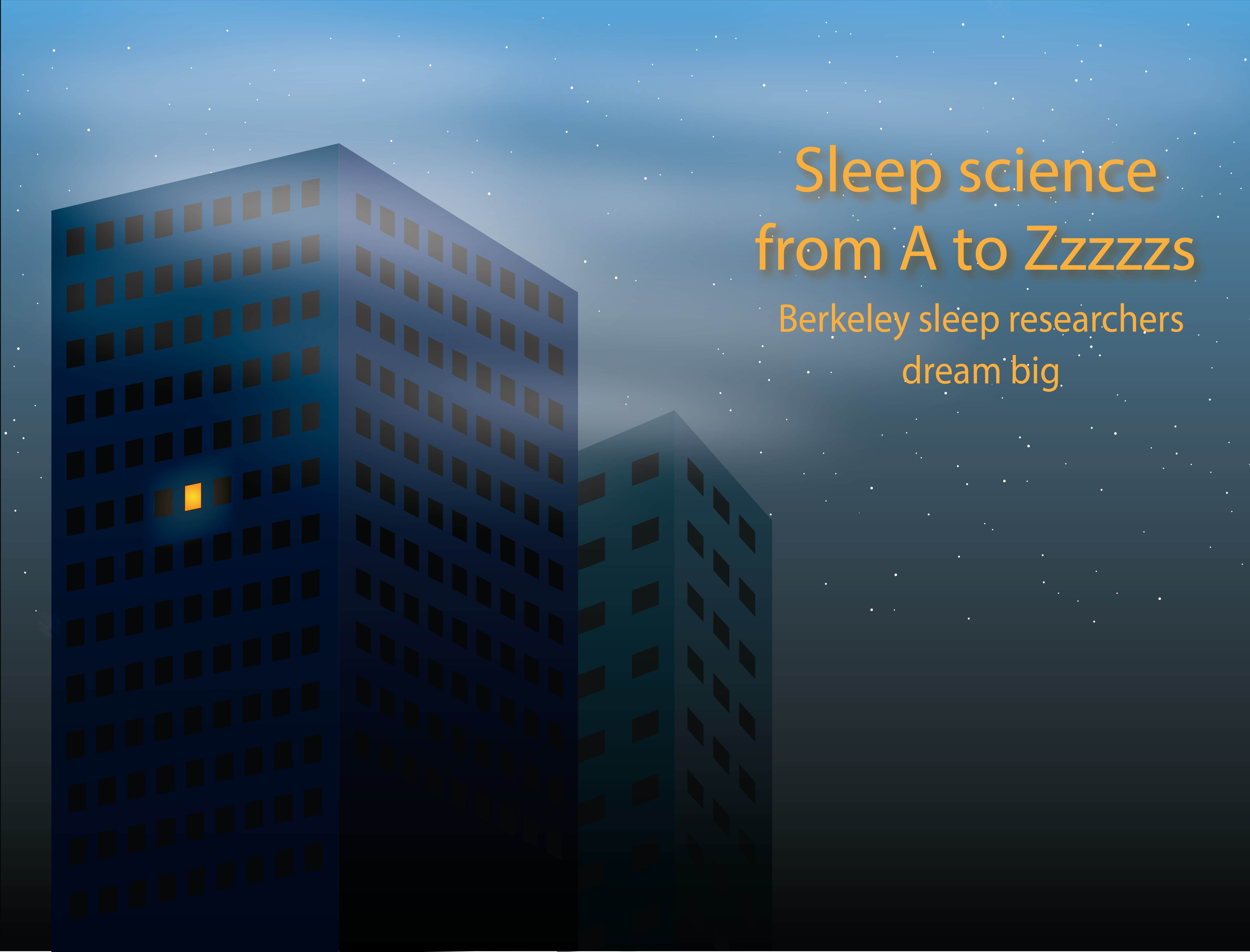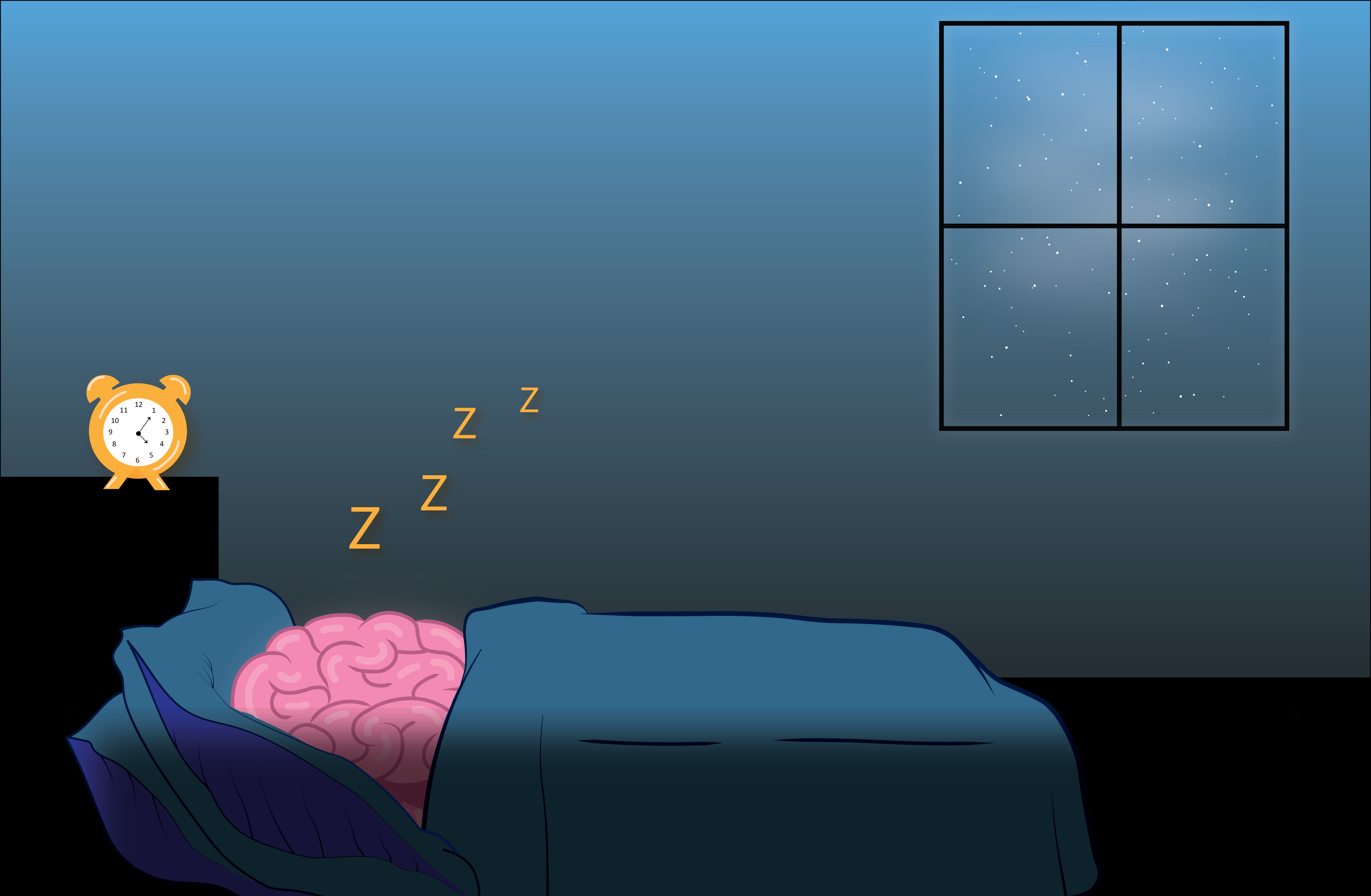Sleep science from A to Zzzzzs
Berkeley sleep researchers dream big

Sleep affects nearly every function in our body, from cardiovascular health to growth and even immunity. In fact, every time daylight savings comes around, we can see the effect of losing or gaining just one hour of sleep on cardiovascular health. A study from the University of Michigan found that losing one hour of sleep when we “spring ahead” to daylight time increases the risk of heart attacks by 24 percent, and the risk decreases by 21 percent when we gain one hour “falling back” into standard time. Sleep loss has also been shown to affect learning, reduce the efficacy of vaccines, and increase the likelihood of cancer. This explains why the average American spends about 26 years and four months of their life sleeping.
Even though sleep is critical to regulating human physiology, according to the Centers for Disease Control and Prevention one in three adults in America report not getting enough sleep. While we know the importance of sleep on human health and the large number of individuals lacking sleep, sleep deprivation’s impact on the brain is relatively unexplored. However, at the Center for Human Sleep Science at UC Berkeley, affiliated with the Department of Psychology and Helen Wills Neuroscience Institute, researchers have been thinking about sleep deprivation and its effects on the mind for quite some time. Directed by Dr. Matt Walker, a professor of psychology and neuroscience at UC Berkeley, the center seeks to further understand the mechanisms underlying the importance of sleep for the brain’s activities, and exactly how sleep loss affects us.
Drifting into sleep science
Those who enter the world of sleep science often start off with a passion for slumberi but rarely know that it's a feasible path to take during their research career. As sleep science has grown in the last two decades, many scientists now “drift into sleep research.” Dr. Eti Ben Simon, a postdoctoral researcher at the Center for Human Sleep Science, has always had a fascination with sleep: “I’ve always loved everything that had to do with sleep. I thought it was magical that at the end of the day, we feel so miserable and achy and irritable, and then we just lie in bed for a couple of hours, and we wake up and the world is beautiful again.” Simon found sleep science during her PhD. “At some point, I came across studies about the human brain and sleep,” Simon states, “and it was like something lit up in my brain; ‘I can study this!’”
Another researcher who finds interest in the study of sleep is Dr. Joe Winer, a former graduate student at the Center for Human Sleep Science. Winer first developed an interest in sleep science from seeing the effects of a night’s sleep on learning. After studying sleep and memory in undergraduate students, he became interested in the connection between sleep and disease. He explains, “We know that sleep is one of the first things that often changes in aging and disease. We know that memory changes too and think sleep’s important for memory. Sleep clearly plays an important role in these feedback loops.” Both the novelty of studying sleep deprivation and the important feedback loops affected by sleep intrigue scientists at UC Berkeley and motivate them to dive deeper into the effect of sleep loss on a variety of brain processes.
However, the irony of studying the importance of sleep is that one must lose sleep during the process. When running sleep trials comparing well-rested and sleep-deprived individuals, researchers work with the test subjects’ sleep schedules. That means months of a constantly shifting wake schedule, mixed with sleepless nights when the researchers must stay up with the sleep-deprived individuals. “I wanted to study the effects of sleep loss on emotion, and I ended up feeling like I was one of the subjects,” Simon details. But the researcher isn’t alone during this. “A sleep lab is really like a team effort,” states Winer, thinking back on the group effort that goes into making the sleep lab run smoothly. Data collection may be grueling, but for those passionate about studying the effects of sleep, it’s worth it.

Make time for sleep: your social and emotional health depend on it
As Simon mentions, sleep deprivation can have major impacts on emotion, which is why one the center’s focuses is understanding the impact of sleep on mental health and on society. For this research, Simon uses a combination of in-lab studies viewing the cognitive impacts of sleep deprivation along with online studies to monitor the effects of natural night-to-night sleep disturbances. In the lab, functional magnetic resonance imagining can show the changes in the activity of different structures in the brain. Pairing this imaging with online studies, where participants sleep as they normally would and then track their sleep and daily anxiety levels, lets researchers detect the functional changes in the brain and extrapolate those changes to real-world effects. For example, even subtle losses in quantity or quality of sleep can predict higher levels of anxiety the next day. Reduced sleep quality can cause losses in important non-rapid eye movement slow wave activity (NREM SWA), which often occurs during deep sleep. NREM SWA is vital for medial prefrontal cortex (mPFC) activity, which is responsible for downregulating the emotional centers in the brain, such as the amygdala. When NREM SWA is lost, the connection between the mPFC and the amygdala is impaired, making emotional regulation much more difficult. “Not getting enough sleep increases people’s anxiety, and it’s a vicious cycle,” explains Simon. “Once you’re anxious, it also disrupts your sleep, and the thing we’re starting to understand is that you can intervene with this cycle from both angles.”
Reduction in sleep quality increases not only anxiety but also feelings of loneliness and social withdrawal. There are two major brain networks that regulate social interaction: the Near Space network and the Theory of Mind network. The Near Space network warns of human approach to the individual, while the Theory of Mind network encourages understanding of human intent. When sleep-deprived, individuals experience hypersensitivity in the Near Space network as well as impairment in the Theory of Mind network. This translates to individuals physically avoiding others more often and disengaging from social interaction, respectively. In addition to negative changes in mood and anxiety, a sleep-deprived person can also feel lonelier. Interestingly, those heightened feelings of loneliness are not confined to sleep-deprived individuals. Simon found that when online judges watched videos of both sleep-deprived and well-rested individuals, judges felt lonelier after watching videos of participants who they ranked as lonelier. “What we think that this means is that lack of sleep can really start a cycle of social isolation,” Simon elaborates, “because, on the one hand, you’re less interested in interaction, and, on the other, other people are less interested to interact with you.”
Seeing that regions of the brain commonly used when we think about other people, such as the Theory of Mind network, have reduced activity in sleep-deprived individuals, Simon wondered how sleep loss would affect altruistic behavior and the desire and likelihood to help others. She found that the same individuals who previously were more likely to help others were no longer willing to help with the same tasks after losing sleep. “Sleep is essential to every physiological system in our body and every process that happens in our brain. So once you don’t get it, functions begin to collapse, one after another,” Simon details. “And one of the things that I’m surprised to see that collapses so fast is how we treat other people.” No more pulling all-nighters
Running low on good-quality sleep not only causes major impacts to our mental and social health but also affects our learning and memory. It’s common for students to pull all-nighters before exams, taking advantage of the night before to get in some last-minute studying. However, doing so can have unintended consequences.
During the day, neural excitability increases, and it’s been found that in extreme prolonged wakefulness, the synaptic saturation from this increasing neural excitability impairs memory formation. Using a mix of polysomnography (PSG), which measures various features such as brain waves, heart rate, and eye movement during sleep, and electroencephalogram (EEG), measuring electrical impulses from brain cells, researchers have found that good-quality REM sleep helps to rebalance and reduce neural excitation to benefit memory retention the next day. This homeostatic mechanism is affected during sleep deprivation, with attenuation of this rebalancing.
The importance of sleep is also apparent in its effects on learning as people age. The hippocampus is a brain structure that plays a major role in learning and memory. Fast sleep spindles, patterns of brain waves that are a hallmark of NREM sleep, are associated with encoding ability and are important for hippocampus-dependent neuroplasticity. Using PSG and EEG to record brain waves during sleep, researchers found that older adults experienced more than 40 percent decrease in fast spindles, which led to a reduction in next-day learning ability when performing an event-related task and a self-paced recognition task the next morning. Clearly, sleep has consequences on memory, and this helps shed light on learning impairments that can be experienced with age.

The downstream consequences of poor sleep
Memory and learning aren’t the only cognitive losses to occur as sleep quality begins to decline due to age. Tau protein tangles and β-amyloid peptides, two molecules associated with Alzheimer’s disease, reduce sleep quality, and accumulate with sleep loss, respectively. Intrigued by this connection, Winer and fellow researchers sought to analyze the relationship between sleep impairment and the build-up of tau and β-amyloid. Primarily, they are interested in the effect of this pathology on the brain once it’s already present. Additionally, they want to understand how sleep can be used to detect and possibly even slow the progression of tau and β-amyloid accumulation.
“We have these sleep data sets going back to 2010, and some of these people have three or four β-amyloid scans now, so can we look at whether their sleep at baseline predicted what happened to their β-amyloid later on?” ponders Winer. “And it seemed like that was the case.” The rate of β-amyloid accumulation increased with increased nighttime wakefulness and with decreased sleep duration and occurrence of low-frequency slow waves during NREM sleep. The cause for this higher accumulation rate could be related to elevated synaptic activity from extended wakefulness or to impaired clearance of β-amyloid, which occurs during sleep. These results demonstrate that monitoring sleep could possibly provide a non-invasive way to predict the progression of β-amyloid build-up.
While sleep affects β-amyloid build-up, tau build-up affects sleep. Both tau and β-amyloid have been associated with worse sleep quality, and they can also affect perceived sleep quality. “In terms of early-on disease progression when people only have β-amyloid, there’s this idea that maybe people have sort of an intuition that something is changing,” Winer says. That intuition becomes evident from this study. β-amyloid burden led to worse self-reported sleep quality, as did tau. However, β-amyloid led to an inaccurate perception of sleep quality as shown using actigraphy, a non-invasive sleep monitoring technique using wearable devices. People with greater β-amyloid burden underestimated their sleep quality, having larger discrepancies between their perceived estimate of sleep and their measured sleep. “We found the classic correlation between people saying that they’re sleeping worse and having more β-amyloid in their brain,” describes Winer. “But then we also showed that β-amyloid wasn’t related to actual sleep disruption. We found, in the study using actigraphy, that it was actually only tau that was predicting an objective change.” Winer’s findings open the possibility for sleep to be used as a measure of β-amyloid and tau build-up as the pathology progresses.
The medicine of sleep
The modern world is chronically sleep-deprived, tending to reward those who put off sleep while looking down on those who protect their sleep. It may seem daunting to see the impact that poor sleep has on mental and physical health: increased anxiety, worse social outcomes, poorer learning and memory, build-up of Alzheimer’s disease-related proteins, reduced immunity and higher cancer risks. There is no doubt that sleep is essential to a healthy life.
So, what can be done about the risks related to sleep deprivation? A silver lining is that sleep itself can be used as a treatment. For anxiety, using techniques for improving sleep quality can lead to reductions in anxiety the next day, which in turn allows for better sleep quality the next night, and so on, helping stop the self-perpetuating anxiety-sleep cycle. Better sleep quality can also possibly be used to help reduce age-related cognitive decline and slow the accumulation of tau and β-amyloid by reducing extended wakefulness and allowing the brain to perform rebalancing procedures during the night.
How is improved sleep quality achieved? “For young people, their sleep is usually very robust, and they have beautiful slow waves when they go to sleep,” explains Simon. “For them, the conversation is more about allowing yourself to get enough sleep. Prioritize sleep.” The conversation changes for those with sleep disorders and people as they age and their sleep becomes less robust. Luckily, there’s a wide variety of research in the field of improving sleep. Cognitive behavioral therapy has been shown to improve insomnia, and physiological changes—such as taking a warm bath before bed, sleeping in cooler temperatures, and keeping to a sleep schedule—have been shown to improve sleep. Researchers are now further exploring how to improve sleep quality in older populations and in those with sleep disorders without the use of medication. In the meantime, sleep quantity is still a very important factor and making time for your sleep can be very beneficial to your health.
Changing the stigma around sleep
Throughout this research, it becomes very apparent that sleep has a big impact on human health and well-being. Sleep scientists find their way into this field through a deep passion for and love of sleep, and it shows through their dedication to communicating the important messages of their science. Dr. Matt Walker, for example, has appeared on podcasts, MasterClass, and news outlets, written his own book, and given a TED Talk discussing the impacts of sleep deprivation. He also runs a podcast and newsletter of his own. The passion for communicating the importance of sleep doesn’t stop with Walker. Simon also has a deep passion for communicating her research—she has made news appearances and runs a blog. “A lot of what motivates scientists in every field is to make an impact and to make a discovery that makes the world a better place, so we can’t afford having science locked up in universities,” states Simon.
Simon hopes to decrease the negative stigma around sleep in a society where getting up early, working long hours, and going to bed late is often rewarded. “Sleep is one of the pillars of life on earth. Just as much as we need oxygen and food and water, we need sleep.” Through Simon’s research, she hopes to open people’s eyes to the wonders of sleep and just how amazing and important it is. Meanwhile, Winer is happy to see the field of Alzheimer’s research beginning to put more attention on the connections to sleep, and he hopes that older individuals know that changes in their sleep are something important that they can mention to their physicians.
We, as humans, have so many demands on our time. While we are often discouraged from prioritizing our sleep, work from the Center for Human Sleep Science shows that doing so leads to happier, healthier individuals, and in turn, a happier, healthier society. “Sleep isn’t something you can control necessarily the way you might be able to control your diet,” recognizes Winer, but focusing on getting quality sleep will provide an added benefit to your day-to-day health and well-being. Simon informs people to “protect your sleep, and it will protect you in return.” Words to live by in a chronically under-slept society.
This article is part of the Spring 2023 issue.





